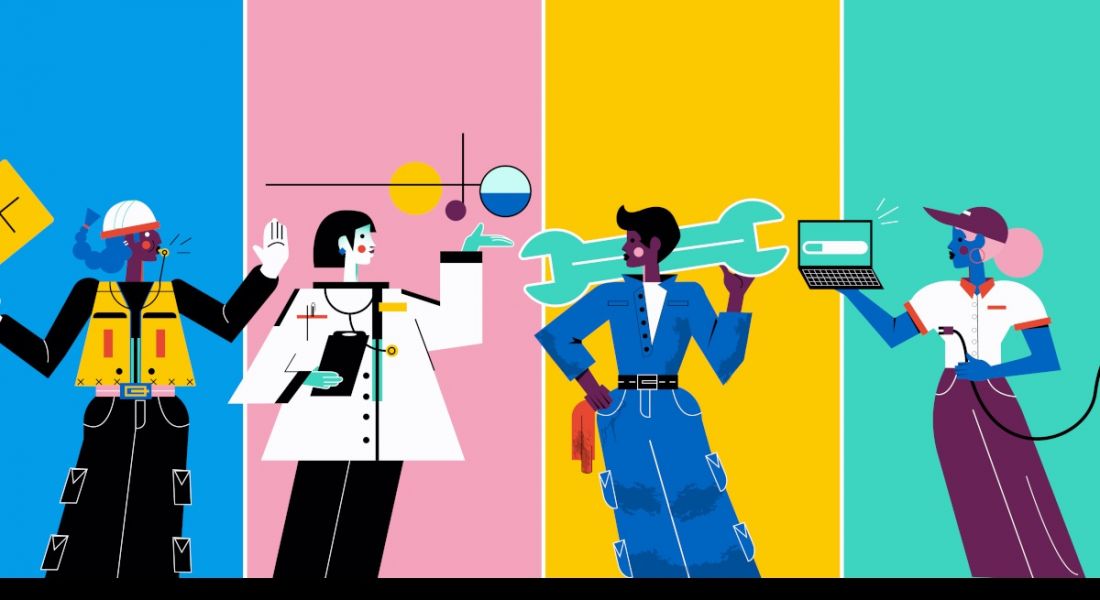Six women share their thoughts and experiences on Ada Lovelace Day, which aims to raise the profile of women in STEM and create new role models for young girls.
Earlier this year, on 8 March, which just happens to be International Women’s Day, we reported that women in the tech sector in Ireland were not faring as well as their global counterparts. That was according to a report by PwC that found that Ireland lagged behind other OECD countries when it came to how empowered women felt at work.
Gender pay gap disparities, lack of supports for women and other socio-economic factors could be contributors to this, but the problem is not just in Ireland. According to a 2022 report, only 35pc of STEM students in higher education in the UK are women, putting the talent pipeline there at serious risk.
This Ada Lovelace Day, which falls annually on 10 October, we heard from six women tech leaders championing the cause of encouraging more girls to consider a career in STEM sectors. Of course, it is worth noting that Ada Lovelace Day today and International Women’s Day on 8 March are only two days out of a very long year. As we have written previously, women in STEM need to be valued all year round. There will be no more Ada Lovelaces, Grace Hoppers, Jocelyn Bell Burnells or Gladys Wests if we don’t get our acts together. So, how can we do that?
Increase the visibility of women role models
For many girls, the first hurdle to exploring a career in STEM is a lack of representation or role models. Unfortunately, a lack of diversity maintains the feeling that girls do not belong in the industry – although that is simply not the case.
Mary-Christine Nolan, VP of global professional services at Pluralsight, is all too familiar with this challenge. “I started my career as an engineer working in cybersecurity – an industry under constant pressure to innovate and deliver – and I understand the challenges that a career in STEM can bring. And having spoken to secondary school students, I know that very few young women see themselves in the industry. However, the opportunities for rewarding careers are in abundance – but we need more representation to show girls it is a viable career path for them,” she says.
“On days like today, it is imperative that we celebrate the success of female role models in tech to help inspire the next generation of talent to join the industry.”
Barbara Maigret, global head of sustainability at Fortinet is also a firm believer that women role models are a key to inspiring the next generation of talent. “When encouraging more women into STEM, it is useful to shine a light on those who have pioneered women’s place in the industry.”
Ada Lovelace was celebrated for her remarkable contribution to the computing industry. Maigret recognises this type of figurehead, pointing out that “Ada Lovelace Day acts as a good reminder that we need to showcase more inspirational female leaders in STEM to inspire the next generation and be a guiding force for those who want to enter the industry”.
Challenge stereotypes and give everyone a voice
CyberArk’s Renske Galema, area vice-president of Northern Europe, highlights the importance of never giving up on the mission to break stereotypes – especially around cybersecurity. “Working in this sector is often viewed as a job centred around technical skills and long hours, which puts people off and has played a large part in it becoming a male-dominated industry,” she says.
“The reality of the matter is these technical skills can be taught on the job and softer, more human skills, such as being able to communicate effectively, are equally as important.”
Ultimately, the responsibility for change must come from the top. Claire Montgomery, senior director of software engineering at Globalization Partners, believes that leadership has a strong role to play in fostering a positive workplace culture. “In my journey from a technical background to a leadership role, I’ve come to realise that leadership extends beyond technical expertise; it’s about making a meaningful impact on the lives and careers of others. In particular, it has always been very important to me to champion other women in STEM careers in order to create a more diverse and inclusive tech industry.
“Of course, how to do this can vary significantly across regions, particularly within global teams, so it is important to give every team member an equal voice and opportunity to contribute,” Montgomery says.
Sue-Ellen Wright, managing director of aerospace, defence and security at Sopra Steria, also echoes this view. “Addressing gender imbalance in tech will be key to widening our talent pool and narrowing the skills gap. Everyone working in the defence industry should be interested in encouraging more women to develop and use their digital skills, not just in school but throughout their careers. But it’s not just about skills and numbers. We also have to create a workplace culture where everyone can thrive.”
Supercharging the economy with a wider talent pool
By encouraging more women into the technology industry, the world will be better equipped with the expertise needed to drive innovation and growth. For Stacey Moser, CCO at Universal Robots, its stance is clear saying, “One of our primary responsibilities at Universal Robots is to unlock human potential. In alignment with this, I would encourage women aspiring to study STEM subjects or pursue leadership roles in the tech industry to follow your interests and pursue subjects that truly ignite your curiosity and passion.”
Closing the gender gap will go a long way towards filling in-demand roles and developing new solutions with diverse perspectives. Sticking with the status quo will stifle growth, so we must empower young girls to broaden their horizons through the creation of women role models and break down the stereotypes that have long existing in the tech industry.
10 things you need to know direct to your inbox every weekday. Sign up for the Daily Brief, Silicon Republic’s digest of essential sci-tech news.




